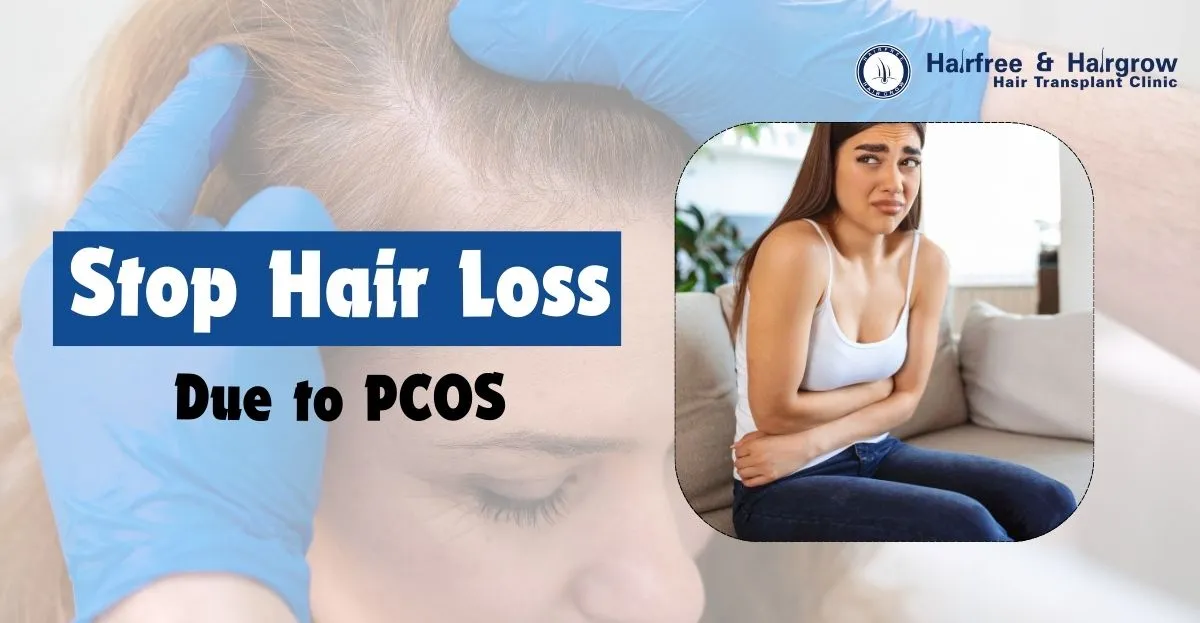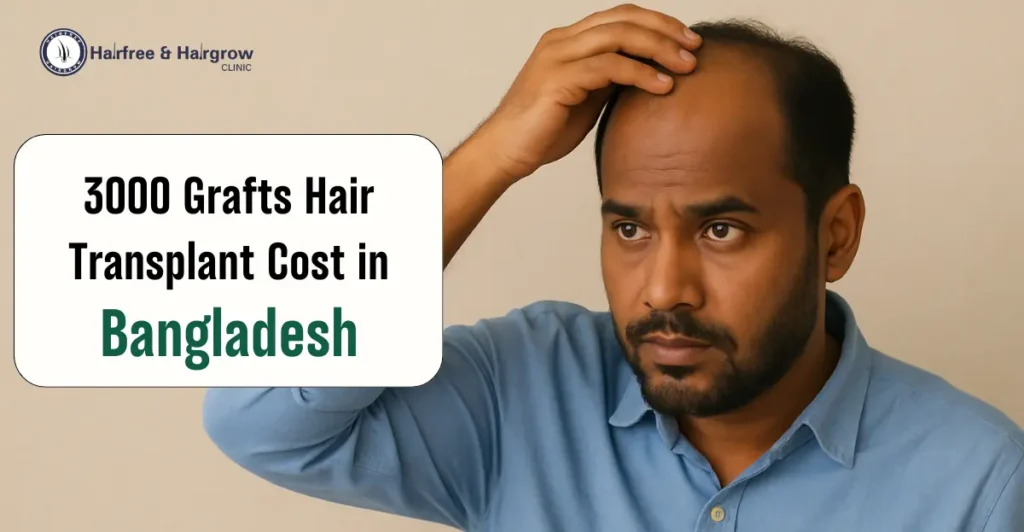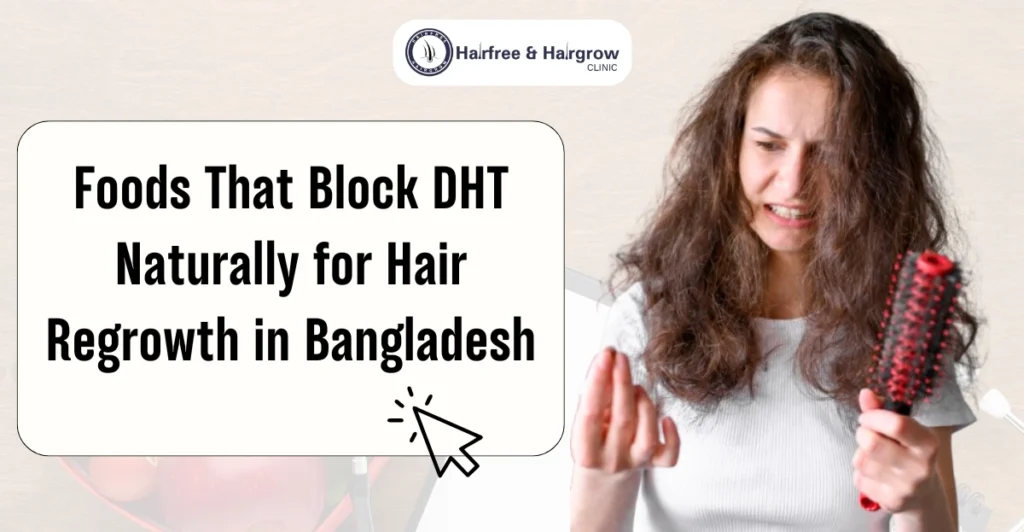Polycystic ovarian syndrome (PCOS) is a common condition affecting many women during their reproductive years. One of its frustrating symptoms is hair loss, often causing women to notice thinning hair, especially at the crown or temples. But why does PCOS cause hair loss, and what can be done about it? In this blog, we’ll explore the reasons behind hair loss and PCOS and how you can manage and even reverse it.
Table of Contents

Why Does PCOS Cause Hair Loss?
PCOS and hair thinning are closely linked due to the hormonal imbalances the condition causes. Women with PCOS often experience an increase in male hormones, like testosterone, and its more potent form, dihydrotestosterone (DHT). This rise in DHT triggers hair thinning and loss on the scalp, while paradoxically promoting hair growth on other parts of the body, such as the face and chest.
Additionally, a decrease in sex hormone-binding globulin (SHBG), a protein that controls the effects of DHT, further worsens the situation.
Other factors like irregular menstrual cycles, anemia, and vitamin deficiencies (especially in vitamin D and B12) can contribute to hormonal hair loss in women with PCOS.
Effective Treatments to Stop Hair Loss Due to PCOS
The good news is there are several effective PCOS hair loss treatment options to manage and even reverse hair thinning Here are some treatments that have been proven to help:
- Oral Contraceptives
Birth control pills, particularly third and fourth-generation ones, can help regulate hormones by reducing the levels of androgens. This helps to stop the excessive production of DHT, reduces hair loss, and prevents unwanted hair growth on the body. Be cautious with first and second-generation pills, as they may worsen hormonal hair loss due to their androgen-stimulating effects. - Spironolactone
Spironolactone blocks the conversion of testosterone into DHT, reducing scalp hair loss and preventing unwanted hair growth on the body. It is an effective PCOS hair loss treatment, but women who are pregnant or planning to become pregnant should avoid it due to potential risks to the fetus. - Minoxidil
Minoxidil is available in both topical and oral forms and stimulates hair growth by increasing blood circulation to the scalp. It’s a popular treatment for hair loss, particularly when used alongside hormonal therapies. - Metformin
Though primarily a diabetes medication, metformin has been shown to reduce androgen levels in women with PCOS. Lowering blood sugar and controlling insulin resistance help improve hormonal balance and can support hair regrowth.
Long-Term Strategies for Managing Hair Loss and PCOS
Diet and Exercise
A healthy lifestyle, including a balanced diet and regular exercise, plays a crucial role in managing PCOS symptoms. Reducing insulin resistance can help lower androgen levels, leading to improved hair health.
Vitamin and Iron Supplements
Addressing deficiencies in vitamins D, B12, and iron is essential for maintaining healthy hair. Proper supplements can improve scalp care for PCOS and support PCOS hair regrowth.
Scalp Care
Taking care of your scalp is equally important. Use gentle shampoos and avoid harsh chemicals that may irritate your scalp. Regular scalp massages can improve blood flow and promote healthy hair follicles.
Our Patients: Overcoming Hair Loss from PCOS
Dealing with PCOS-related hair loss was challenging and affected my self-esteem. After trying various treatments, I found success with a combination of medications, stress management, and a healthy diet. Topical treatments and hormone-balancing treatments helped stop the loss, and I began to see hair growth again. Slowly, my confidence returned and hair became healthier. If you’re struggling, know that there are effective solutions—don’t lose hope!
When to See a Doctor
If you’ve noticed hair thinning or unusual hair growth patterns and suspect PCOS may be the cause, it’s important to consult a doctor. A healthcare professional can help by conducting blood tests to check hormone levels, including testosterone, DHT, and SHBG. They can also rule out other potential causes of hair loss like thyroid disorders or nutritional deficiencies.
Looking for effective solutions to stop hair loss and restore your confidence? Hairfree HairGrow Bangladesh offers advanced treatments tailored to your unique needs. Call us today at (+880) 1974223921 to schedule a consultation and start your journey to healthier, fuller hair!
Conclusion
PCOS can be a challenging condition, especially when it leads to hair loss. However, with the right treatment plan, you can manage your symptoms and even regrow lost hair. From medications like birth control pills and spironolactone to lifestyle changes like a balanced diet, there are plenty of options to explore. Managing PCOS symptoms is crucial to maintaining healthy hair and overall well-being.
FAQ
Yes, with proper treatment and management of hormones, hair regrowth is possible for many women with PCOS.
It can take around 3 to 6 months to see noticeable hair regrowth, depending on the treatment used and the individual’s response.
Side effects can include weight changes, mood swings, and changes in menstrual cycles, but these vary from person to person.
A healthy diet, regular exercise, stress management, and taking supplements for any nutrient deficiencies can be effective natural approaches to managing PCOS-related hair thinning.

Written By
Dr. Nazmin Nipa
Medical Officer & Hair Transplant Surgeon
Dr. Nazmin Sultana Nipa is a distinguished hair transplant doctor in Bangladesh, known for her advanced skills in hair restoration. As a Medical Officer and Hair Transplant Surgeon, Dr. Nipa combines her extensive experience in the field with a focus on transparency and patient-centered care.
Disclaimer
We’ve made all possible efforts to ensure that the information provided here is accurate, up-to-date and complete, however, it should not be treated as a substitute for professional medical advice, diagnosis or treatment. See Detailed Disclaimers Here.



